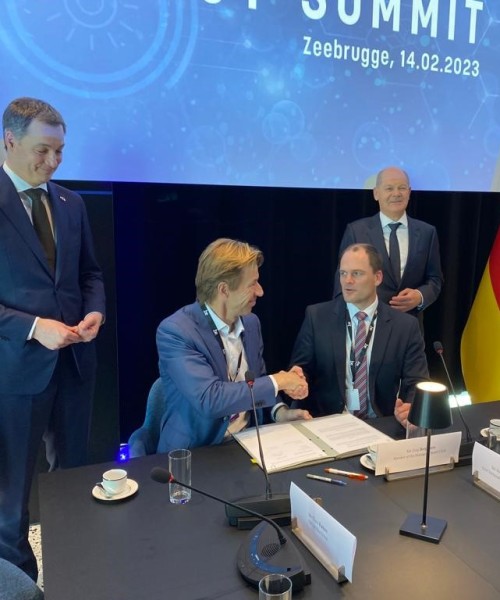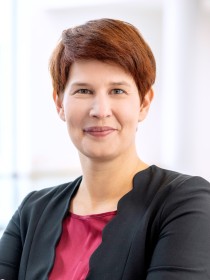Elia and Amprion commit to close collaboration for second German-Belgian interconnector
Zeebrugge | The German transmission system operator Amprion and its Belgian counterpart, Elia, have signed a Memorandum of Understanding (MoU) relating to the construction of a second cross-border interconnector. Preliminary studies have shown that a second interconnector would have the potential to help both countries meet their future energy needs, creating socioeconomic welfare for consumers in Belgium and Germany - and, by extension, for the whole of Europe. Amprion and Elia plan to publish a concept note by mid-2024 that will be the basis for the further design and development of the project.

First step in a long process
The signing ceremony for the MoU took place against the background of today’s Belgian-German Energy Summit in Zeebrugge, which was attended by the Belgian Prime Minister, Alexander De Croo, the German Chancellor, Olaf Scholz, the Belgian Federal Minister of Energy, Tinne Van der Straeten and the German State Secretary at the Federal Ministry for Economic Affairs and Climate Action, Dr Patrick Graichen.
The MoU is the first step in a long process. Elia and Amprion will now work on a joint study to explore which configuration and technology are most suited to meeting the objectives of the project. A concept note is due to be published by mid-2024.
Not before 2037
The final investment decision will depend on several criteria. For example, the project should contribute to the integration of renewable energy into the energy systems of both countries, strengthen their security of supply and have a positive impact on the European electricity market (price convergence). If the business case is positive, the interconnector will only be commissioned after 2037. This is because additional reinforcements will need to be carried out across the domestic grids to optimally integrate the interconnector into the system.
“Together, Elia and Amprion aim to decarbonise the energy system in Europe and to strengthen security of supply and system stability. Electrification is crucial for decarbonising the energy system. We already know that the demand for electricity in the climate-neutral energy system in Europe will increase significantly. To meet this demand, we need to integrate large amounts of renewable energy and transport it to where it is needed. Therefore, exchanging energy in Europe is particularly important for achieving the climate goals. Accordingly, we must expand the transport capacities for electricity between Belgium, Germany and the whole of Europe. An important milestone to achieve these goals is the realisation of a second interconnector between Belgium and Germany“, says Dr Hendrik Neumann (CTO, Amprion).
“Elia Group’s study on the electrification of industry has shown that electrification and access to renewable energy offer long-term price stability,” says Elia Group CEO Chris Peeters. “The energy transition isn’t just good for the climate, it also contributes to socioeconomic welfare. We have seen the importance and success of ALEGrO. We are aware of the additional needs for further interconnectors between Belgium and Germany and are acting swiftly. We have a very good relationship with our colleagues at Amprion. We are looking forward to contributing to the construction of infrastructure which carries strategic importance for both Belgium and Germany.”
Excellent operational results for ALEGrO
The first Belgian-German interconnector (ALEGrO) was commissioned in November 2020, so forming an essential link in the establishment of an integrated European electricity grid. Since then, it has enabled 10 TWh of electricity to be exchanged between both countries. In 2022, ALEGrO was available for 98% of the time and enabled 5 TWh of electricity to be exchanged between both countries. During 2022, electricity flowed towards Belgium 63% of the time (it flowed towards Germany 37% of the time).
Invest now for a more sustainable and independent energy system
The war in Ukraine made it clear that energy is a precious resource and a strategic asset. The European Commission confirmed this in May 2022 with the publication of the REPowerEU plan, which aims to decrease Europe’s dependence on Russian gas and sets out even more ambitious renewable energy targets that build on the Fit-for-55 ambitions. Elia and Amprion acknowledge that the further and faster development of onshore and offshore (hybrid) interconnectors is essential for facilitating the energy transition, since they support energy systems as increasing amounts of renewable energy are integrated into them.
Interconnectors offer several advantages
Since Europe’s renewable energy potential is unevenly distributed across the continent, countries like Belgium and Germany will need access to non-domestic renewable energy sources to meet their future electricity demand. Interconnectors offer several benefits: they facilitate access to renewable energy and flexibility assets (e.g. large-scale hydro power plants) across Europe, whilst also levelling out local fluctuations in wind power. This improves security of supply and flattens prices curves between different markets.
Cost-benefit ratio from 2035 onwards
Preliminary results have already demonstrated that a second Belgian-German interconnector would have a positive cost-benefit ratio from 2035 onwards. The project was therefore approved as part of the 2021 German Network Development Plan. The 2020-2030 and 2024-2034 Belgian Federal Development Plans, as well as the Ten Year Network Development Plan (ENTSO-E), have also confirmed the positive impact that the interconnector would have. It would contribute to the socioeconomic welfare of both countries (and of Europe as a whole), would lead to a reduction in CO2 emissions and would support the integration of increasing amounts of renewable energy sources into the grid.
